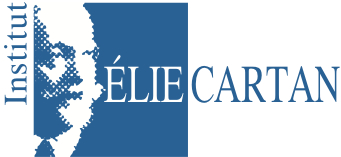AFTERNOON REPRESENTATION THEORYONLINE MEETING |

|
Institut Élie Cartan de Lorraine
|

|
AFTERNOON REPRESENTATION THEORYONLINE MEETING |

|
Institut Élie Cartan de Lorraine
|

|
|
Université de Lorraine Institut Élie Cartan de Lorraine Bâtiment UFR-MIM 3, rue Augustin Fresnel 57070 METZ Link Zoom |
13:45 - 14:35:
Estanislao HERSCOVICH
(Université Grenoble Alpes)
Title: Renormalization in quantum field theory (after R. Borcherds)
Abstract:
R. Borcherds has introduced a different point of view to formalise perturbative Quantum Field Theory
(pQFT), which shares however several features with those already known in the literature and that are based
on work of E. Stueckelberg and A. Pettermann, and H. Epstein and V. Glaser, and more recently of R.
Brunetti, K. Fredenhagen and their collaborators, and of C. Brouder, B. Fauser, A. Frabetti, R. Oeckl, to
mention a few. In particular, he uses several objects which behave somehow like bialgebras and comodules
over them, and which are essential in his definition of Feynman measure. The former objects don’t seem
however to be bialgebras in the classical sense, for their product and coproduct are with respect to two
different tensor products, and similarly for comodules. Moreover, following physical motivations, these
objects are given as some symmetric constructions of geometric nature.
The aim of this talk is on the one hand to show that the “bialgebras” and “comodules” introduced by
Borcherds cannot “naturally” exist, and on the other side to provide a background where a modified version
of the so-called “bialgebras” and “comodules” do exist. This involves a category provided with two monoidal
structures satisfying some compatibility conditions. As expected, the modified version of the mentioned
“bialgebras” and “comodules” are not so far from the original one, considered by Borcherds. Moreover, I
will explain how these new candidates allowed us to prove the first main results stated by Borcherds in his
article, which we shall also briefly discuss, namely, the existence of Feynman measures and the free and
transitive action of the group of renormalizations (for more details see my manuscript "Renormalization in
Quantum Field Theory (after R. Borcherds)”).
Slides of the talk: [pdf]
Video: [mp4]
15:00 - 15:50:
Nadir Matringe
(Université de Poitiers)
Title: Galois distinction inside L packets for SLn
Abstract:
Let E/F be a quadratic extension of p-adic fields. An admissible
irreducible complex representation π of SLn(E) is called distinguished if
HomSLn(F)(π,C) is nonzero.
Such representations are the objects studied by
the relative Langlands program, developped by Sakellaridis and Venkatesh for spherical pairs,
and by D. Prasad for Galois pairs such as
(SLn(E),SLn(F)).
Representations of SLn(E) are naturally grouped in ackets by the local Langlands
correspondence, and we are interested in the following question: if π is distinguished, how can one
characterize the distinguished elements of
the L-packet L(π)?
We will give an answer in terms of degenerate Whittaker models when π is unitary,
and if time allows we will state the global analogue of this result. This is a joint work with U.K.
Anandavardhanan.
Slides of the talk [pdf]
Video: [mp4]
16:15 - 17:05:
Job KUIT
(Universität Paderborn)
Title: The rank condition for discrete series representations
Abstract:
Let G be a real reductive group and H a closed subgroup so that the homogeneous space Z=G/H admits a
positive G-invariant Radon-measure. A discrete series representation of Z is an irreducible
subrepresentation of the space L2(Z) of square integrable functions on Z. For reductive groups
and, more
generally, reductive symmetric spaces the existence of discrete series representations is determined by a
geometric condition called the rank condition. In this talk I will present a new proof for why the
existence of a discrete series representation of a real reductive group G implies the rank condition. The
presented approach has the potential to generalize to real spherical spaces. This is joint work with
Bernhard Krötz, Eric Opdam and Henrik Schlichtkrull.
Slides of the talk: [pdf]
Video: [mp4]